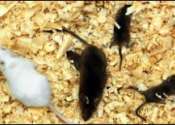Manipulating memory in the hippocampus: Protein modification may help control Alzheimer's and epilepsy
In the brain, cell-to-cell communication is dependent on neurotransmitters, chemicals that aid the transfer of information between neurons. Several proteins have the ability to modify the production of these chemicals by ...
Jun 3, 2013
0
0



